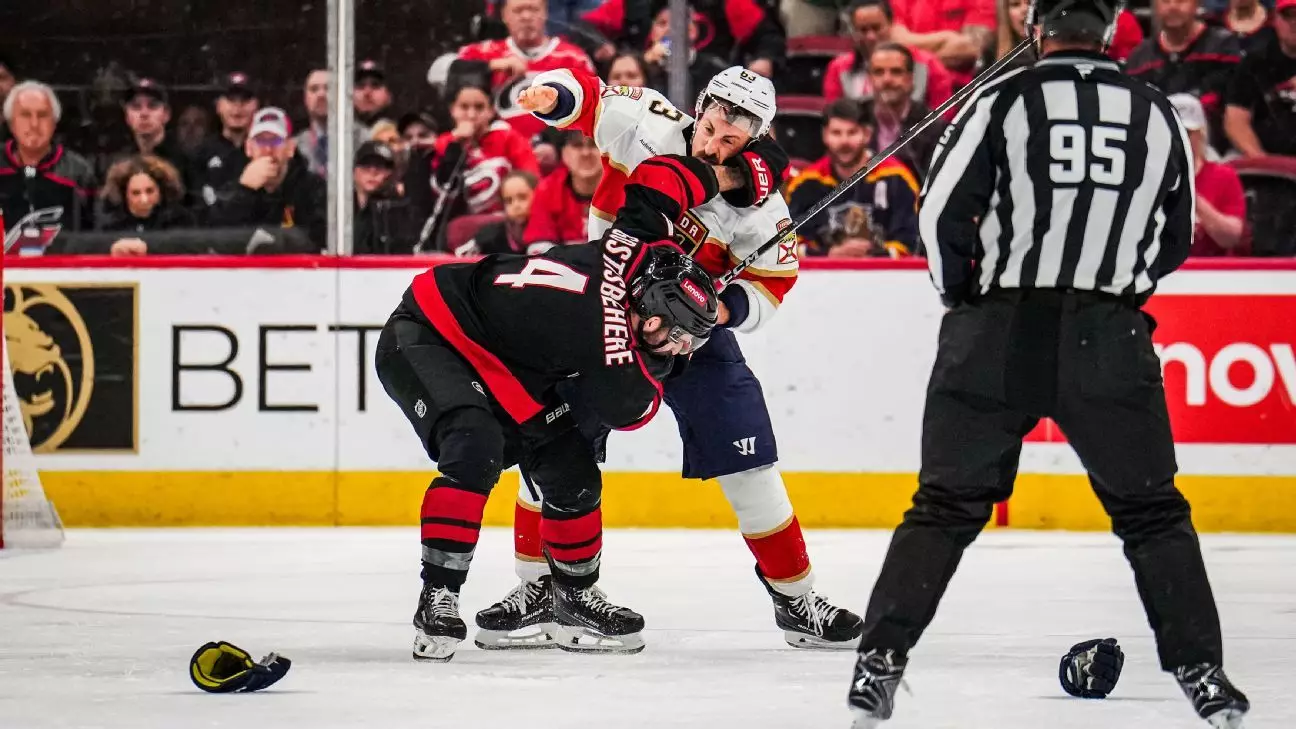In the competitive world of the NHL, playoff success often hinges on more than just skill and strategy; psychology plays a pivotal role. The Carolina Hurricanes find themselves grappling with this confrontation dynamics as they face the Florida Panthers in the Eastern Conference finals. Coach Rod Brind’Amour recently highlighted an essential aspect of the game — the need for players to maintain emotional restraint against the Panthers’ infamous provocation tactics. As the Hurricanes navigate these high-pressure situations, mastering their emotions will be crucial to overcoming their opponents.
The Panthers have notably crafted their identity around aggression and physicality, an approach that has proven effective in their past successes, including securing their first Stanley Cup title last season. As Brind’Amour pointed out, recognizing these tactics is vital. Players must develop a strategic mindset that allows them to sidestep the emotionally driven mistakes that could cost them crucial games. The challenge lies in adhering to this philosophy, particularly when tensions run high during playoff competition.
The Consequence of Retaliation
One pivotal moment of Game 1 illustrated this struggle against the emotional whirlpool of playoff hockey — Sebastian Aho’s retaliatory roughing penalty against Anton Lundell. Aho’s frustration led him to lash out, momentarily sacrificing the team’s advantage on what had been a promising power play opportunity. The ripple effect was immediate, as the resulting penalty allowed the Panthers to capitalize and score, giving them an early lead. Brind’Amour’s frustration with retaliation penalties is understandable; the mental lapse transformed what could have been an advantageous situation into yet another uphill battle for the Hurricanes.
The challenge becomes multifaceted: players must filter their instinctual reactions and focus on the bigger picture. Each retaliatory action not only hampers the immediate play but also disrupts the momentum of the game. This pattern has been reinforced by the Hurricanes’ mixed outcomes when scoring first in playoff games; the correlation between composure, discipline, and success is evident. Missing those scoring opportunities can lead to a detrimental cycle of anxiety and mistakes, further compounding the pressure players feel.
Coping with Provocation: A Cultural Shift
Adapting to the physicality and nuisance tactics employed by the Panthers requires a cultural shift within the Hurricanes’ framework. It’s not merely a matter of self-control but creating an environment that embraces composed resilience under pressure. The Hurricanes’ captain, Jordan Staal, aptly noted the need for limiting mistakes, which goes hand in hand with maintaining mental clarity. This sentiment must echo throughout the locker room, fostering a team-wide commitment to self-discipline.
Meanwhile, the Panthers’ players exhibit a stoic demeanor that speaks to their experience in high-pressure situations. Notably, Sergei Bobrovsky, the Panther’s goalie, showed remarkable steadiness in the face of aggressive plays. His ability to remain unfazed by physical encounters in the crease serves as a model for the Hurricanes to emulate. This composure is detrimental not only to individual performance but also in establishing a collective sense of confidence that can carry through the playoffs. The ability to remain unwavering amidst chaos often separates successful teams from those who falter.
Analyzing Game Strategies
In addition to emotional regulation, a close examination of Game 1 strategies reveals that the Hurricanes need to recalibrate their approach to pressing the Panthers defensively. The aggressive style of play has to be mirrored with a thoughtful anticipation of the Panthers’ counterattacks. With the Panthers showing they can effectively navigate through physical encounters without losing their structural integrity, the Hurricanes must devise tactics that allow them to protect their net without being overly reactive.
The interplay between offense and defense stands pivotal. When deep into the attacking zone, the chances of collisions increase exponentially. Recognizing when to hold back rather than barreling in can prevent unnecessary penalties and help maintain the crucial flow of play. As observed, the Hurricanes found themselves in possession of the puck yet faltered due to penalties that turned the tide against them. Such lessons must be taken to heart, as postseason hockey should be executed with calculated precision, a stark contrast to reckless engagement.
The Road Ahead
With Game 2 looming on the horizon, the stakes escalate. The Hurricanes must galvanize themselves into a cohesive unit that prioritizes emotional intelligence as a weapon against the Panthers’ intimidation tactics. The journey toward reclaiming control against a vexing opponent requires more than just physical might; it demands an entire paradigm shift towards embracing poise and strategic aggression.
The real challenge lies ahead for the Hurricanes, as they strive not only to overcome the physical demands of playoff hockey but also to navigate the psychological labyrinth that defines the rivalry with the Panthers. The ability to channel their energies and respond strategically rather than emotionally will ultimately be determinant in their quest for success.

